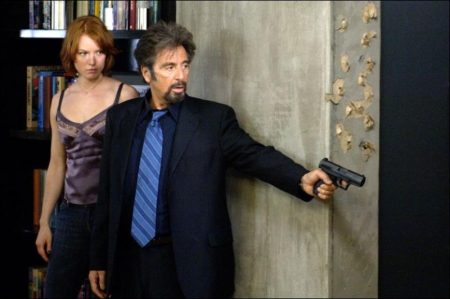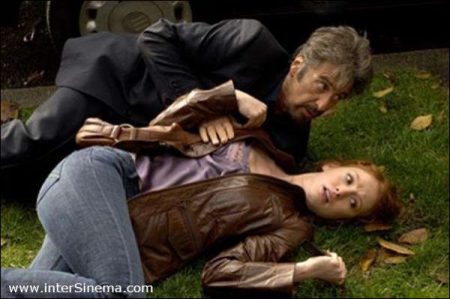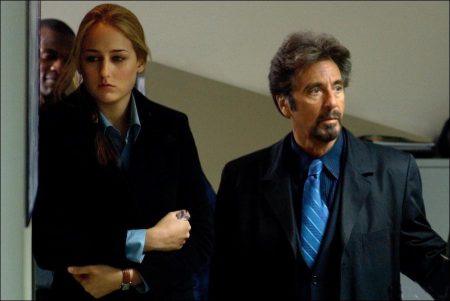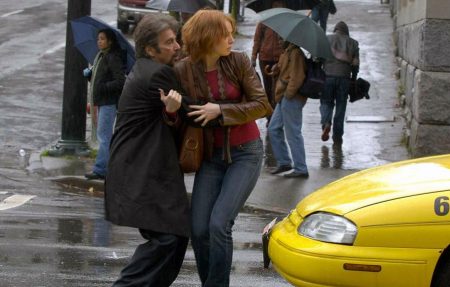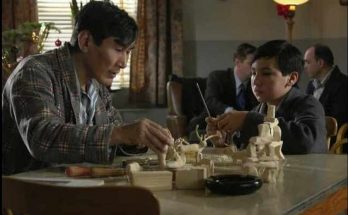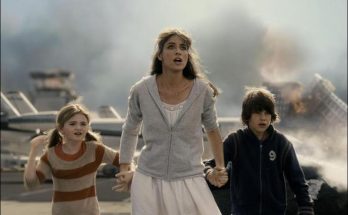Tagline: He has 88 minutes to solve a murder. His own.
88 Minutes movie storyline. Famed forensic psychiatrist Dr. Jack Gramm has built a reputation for successfully profiling serial killers, including Jon Forster (Neal McDonough), who was sentenced to death primarily on the strength of Gramm’s expert testimony. One night before Forster is scheduled to be executed, the city of Seattle is rocked by a killing that matches his crimes exactly-and the victim is one of Gramm’s students.
Gramm is determined to prove the murder is the work of a copycat, but he soon finds himself contending with Forster’s well-orchestrated public relations campaign to discredit him, a second copycat killing and a series of mysterious phone threats, starting with one that tells him that he has just 88 minutes to live.
Convinced that the threat and the murders are connected, Gramm turns to his assistant Shelly (Amy Brenneman) and his top graduate students for help in getting to the bottom of the mystery. As he is drawn deeper and deeper into the case, dark secrets from his past begin to emerge, forcing him to consider that the conspiracy is coming from his inner circle. Even his former contact at the FBI (William Forsythe) begins to doubt him, as Gramm’s list of possible suspects lengthens and his remaining time dwindles.
As the calls continue the relentless countdown to his doom and Gramm’s paranoia escalates, so do the very real attacks against him-until he has only himself and his finely honed instincts to discover the truth before his 88 minutes are up. A paranoia-fueled thrill ride that takes place virtually in real time, 88 Minutes goes inside the brilliant mind of a man whose business it is to suspect the worst in people. This tense psychological thriller follows an FBI profiler down a rabbit hole of violence, deception and intrigue.
About 88 Minutes
“This message is for Dr. Jack Gramm…You got the wrong man… You have 88 minutes to live. 88 minutes, Dr. Gramm. Tick tock.”
“There’s one thing in every story that is literally the guts of the movie,” says Jon Avnet, the director and producer of 88 Minutes. “In this case, the guts of the movie are Al’s character, Jack Gramm.”
The Academy Award-winning actor’s portrayal is a classic Al Pacino performance-mercurial, kinetic and charismatic. A respected forensic psychologist who is a frequent expert witness for the FBI and the Seattle police department, Gramm’s powers of observation and deductive reasoning are pushed to their limits in the most intense hour and half of his life, as he tries to catch a killer before the killer catches up with him.
88 Minutes is the first collaboration between Pacino, the legendary star of such acclaimed films as The Godfather trilogy, Scarface and Heat, and filmmaker Avnet, whose numerous producing and directing credits include the Oscar® nominated Fried Green Tomatoes. Avnet acknowledges that two Hollywood powerhouses on the same set can be a potentially explosive combination.
“I wasn’t sure whether our personalities would click or clash, since we’re both kind of high-strung, opinionated people,” says Avnet. “But, like any living person, I’m an admirer of his work. He may be the best working actor in the film business today. You’d have to be deaf, dumb and blind not to be aware of that, and not to wonder what it’s going to be like to work with him.”
Avnet’s anxiety evaporated after their first meeting. “We hit it off pretty quickly. It was obvious to me he had a lot to offer and I think to him it was equally obvious that I knew what I was doing. The process of figuring out the best way to work together was a pretty interesting collaboration.”
Randall Emmett, another of the film’s producers, was sure the role of Dr. Gramm, the brilliant, impulsive and charming master criminologist, would be an ideal part for Pacino to sink his teeth into. “I think to find a character with this much depth and this much complexity in a real commercial thriller is a gem,” he says. “We sent Al the script thinking, ‘Wow, Al Pacino in this role would be magic.'”
After receiving an anonymous phone call telling him he has 88 minutes to live, Gramm turns his considerable resources toward tracking down the source of the call. At the same time, he is being taunted through the media by convicted serial killer Jon Forster, known as “The Seattle Strangler.” Gramm’s testimony in court sealed the Strangler’s fate, but after two copycat killings take place within hours of when Forster is scheduled to die, he receives a stay of execution. Not only are Gramm’s professional judgment and ethics suddenly called into question, but because of his connections to both victims, he is suspected by some of staging the murders himself. In the course of one morning, he is stripped of all his defenses and left to face his unseen assailant’s threats in a state of pure, raw emotion.
“I’m always attracted to a story that has a hook you can pitch,” says Emmett. “I started reading it and couldn’t put it down. From first page to the last, it moved and that’s what I’m always looking for as a producer-a story that really grabs you and has characters that you really feel for, and at the same time is a fun ride.”
Avnet set to work tailoring the script to Pacino’s talents. “Jack’s inner demons are raging. Those are the kind of characters I think Pacino plays better than anybody. The movie’s journey is not just the resolution of a plot, but the emotional evolution of a person who’s been victimized. I think that will probably be the most surprising part of the movie. I think audiences will be surprised by who did what and how, but I think on an emotional level, Al’s character and the revelation of who he really is will be quite powerful.”
88 Minutes captures a single morning in the life of Gramm, who has trained as a physician, academic and attorney. As a professional “profiler,” Gramm has carved out a prestigious niche for himself that puts all his skills and talent to use. But unknown even to those closest to him, he also uses his professional expertise to ward off his own deepest fears and regrets-until the day he becomes the hunted rather than the hunter and his carefully structured world begins to unravel.
That component of the story is exactly what attracted Pacino to the film. “I’m always looking for passion in a role,” says the actor. “Something to make you feel. And this film has some scenes with quite a bit of emotion in them. The first goal with a movie like this is to entertain, to involve, to engage, to make people feel caught up. The movie is a thriller at its heart, but it has other interesting aspects. It’s a simple story, but it speaks honestly about a couple of things. It’s always fun if you can squeeze that into a picture.”
After more than 40 years as an actor and almost 50 feature films, Pacino knows the people he chooses to collaborate with are integral to the process and outcome of the movie-making experience. He feels that he discovered a partner in Avnet. “Jon and I would meet on the set or go out to dinner and try to discover what the next day of shooting would be about. We would go into it together and invent. Jon did a lot of inventing right there while we were shooting. Even when I was not ready to do it, he would try to pull me out and get me to make suggestions, which I found very helpful.”
Avnet says he was interested in 88 Minutes because the story is different from anything else he has directed. “I thought I could do something kind of compelling with it. The simplicity of the concept-a person gets a phone call telling him that he has 88 minutes to live-it’s pretty easy to follow. If you got a phone call telling you had 88 minutes, 88 hours, eight days, eight months, what would you do? I think if most people got a call like that, they’d run around like a chicken without a head.”
But when Gramm receives that call, he doesn’t panic. Instead, the mysterious message galvanizes him and his investigative instincts kick in. As Jack rallies his best students and most trusted associates to help him, he channels his fear and anger into a breakneck race against time to discover who is behind the threats.
“He is a haunted character,” says Pacino, “and there’s this question of how much he really wants to live. I think he has a different relationship with death than most people. He’s been threatened before, and he sort of assesses it and then tries to figure it out. He’s in the business of evaluating threats. Once Jack’s forewarned that his life’s in danger, he becomes more concerned with finding out who it is than his life being in danger.”
88 Minutes essentially unfolds in real time, as Gramm tears through the city of Seattle in search of answers. Avnet says he was less interested in the lightning fast pace of the story than the possibility of shooting a movie from the paranoid point of view of its main character. “Paranoia is not assuming that when you walk across the street you’re going to get to the other side. It’s assuming that when you’re walking across the street, it’s going to evaporate into an earthquake and you’re going to be subsumed by it.”
A forensic psychiatrist, Avnet observes, is often called upon to testify in cases to help determine whether someone is legally sane. “Jack is a professional paranoid,” he says. “Imagine being thrust into a world where you’re meeting people who have committed some of the most horrific and egregious crimes against humanity. And the one similarity between all these serial killers is that they can pass for sane. When they’re caught, what does everyone say about them? ‘Oh, they were so normal.’ ‘He was such a nice guy.'”
The disconnect between who these criminals appear to be and who they really are is so graphic, says the director, it’s virtually incomprehensible. “So if your job is to hunt these people down, or to help convict them, or to find the truth about them, what’s the nature of your perception process? It’s not going to be normal.”
But Pacino’s character is even more deeply troubled by events that took place well before he emerged as one of the best known practitioners of forensic psychiatry. “That’s one of the reasons I wanted to do it,” says the actor. “Jon went deep into the character of Dr. Jack Gramm-why he is the way he is. What being victim to a horrific act does to people. Not just the people who die, but who they leave behind, the people who suffer and have to live with the loss.”
“You should know what it feels like to be minutes from your own death. To hear the ticking of the clock and know your time on earth is drawing to a close. 88 minutes ring a bell to you?”
When casting a film, Avnet says he looks for actors with a strong point of view who will not just inhabit their characters, but help shape them. That approach pays off when the cameras start to roll, as actors are called on to bring all their instincts, life experience and research to bear on their performances.
“I don’t rehearse the scenes that much, but I really work on the character with the actor,” he says. “We had lots of readings beforehand. We talked about things, discussed things. But I like that kind of nervousness that takes place before you have to perform. I like the edginess and the unknown. I think the art of directing on film is to allow the actors to actually have a moment of discovery on camera.
Avnet’s cast on this project includes a quartet of talented women known as much for their brains as their beauty. Kim, the professor’s graduate assistant and all-around girl Friday is played by Alicia Witt, who got her start as an actress at the age of nine in David Lynch’s sci-fi epic, Dune. Much younger than Jack, Kim harbors unrequited affection for her teacher. As she dives deep into the mystery at Jack’s side, the line between personal and professional begins to blur and her unresolved feelings complicate her actions.
To prepare for her role, Witt threw herself into researching forensic psychiatry. “I read a number of books about it, because my character is a doctoral candidate. It’s a rough field. It’s dark and it’s a world of suspicion and mistrust and dealing with the most psychotic minds that exist. I wanted to get into that a little bit and just understand what it is to assess someone.”
Avnet says he was impressed by Witt’s willingness to go the extra mile. “She went through a laborious audition process and she was very responsive in that sense, and somewhat fearless. She’s a great spirit and took a pretty challenging part. She didn’t let the fact that she’s so smart get in the way of the emotions of the character. Her vulnerability allowed her to come up with a performance that I think is pretty special.”
Avnet’s collaborative approach to dealing with actors added to her confidence on set, says Witt. “He watches very closely and he notices a lot more than most people do. And he knows how to talk to an actor to get the result he’s looking for, without making you feel like he’s judging you. He is so receptive to ideas and feedback and he’s really, really wonderful about listening to what other people have to say.”
Leelee Sobieski plays Lauren Douglas, one of Gramm’s most gifted students. The 24-year-old already has a resume full of impressive work, notably a star turn as Joan of Arc opposite a galaxy of established stars when she was only 16. She has been friendly with Avnet since working with him on the 1999 miniseries “Uprising.” The director sent her a copy of the script and gave her an afternoon to read it.
“In the end, I had about three hours to make up my mind,” she says. “It was like, if you want to do this, you better really want to do this, and you better be able to decide now. Jon wanted that passion and conviction. He wanted to know that everybody was going to work hard.”
“Jon didn’t really have to say very much to me,” the actress continues. “He would just give me a little kernel and I turned it into a mountain of stuff to work with. Nothing was ever predetermined. There wasn’t ever a moment in the script where I said, okay, this scene is going to go in this direction. We just came up with whatever we came up with in that moment, on the day-like in reality.”
Avnet says that Sobieski is a very intuitive actress. “She had a pretty complicated role to put together,” he points out. “People are going to be really impressed by what she brought to the character. She did quite a bit of research into forensics and about serial killers. She really immersed herself in a way, and when the movie was over, it was kind of difficult for her to get out of the character.”
Deborah Kara Unger, who plays Carol Lynn Johnson, a college dean and one of Gramm’s many past lovers, has worked with directors as diverse as David Cronenberg and Norman Jewison. She found working with Avnet to be an extraordinary experience. “If the world of a film is like a chessboard, whether you’re a rook or a knight, or a queen or a king, being directed by Jon is like being directed by Bobby Fischer. It was fascinating to be part of the dynamic of an end game that is so clearly thought out and yet only revealed to you in the moment.”
Unger says the script is an exhilarating adventure for the reader and believes Avnet’s experience as both a writer and a director were the key to making the transition from the page to the screen successful. “It’s a very fast-paced, complicated world. Because Jon is the creator in both arenas, I was confident it would be actualized with precision. That’s what Jon is skilled at.”
Even with more than three dozen films under her belt, Unger was amazed by the experience of working with Pacino. “Al gave me a greater gift than I even anticipated,” she admits. “He reminds you why you love what you do. It’s just as easy as breathing air with him. It’s effortless, because he is completely present.”
Amy Brenneman, probably best known as the star of the CBS series “Judging Amy,” plays Shelley Barnes, Gramm’s longtime assistant. Shelley is Jack’s lifeline to the world, but despite her devotion, she has an ugly secret of her own that threatens to derail everything she and Jack have ever worked for.
Brenneman says she had a very simple reason for taking the role. “I wanted to be Al Pacino’s sidekick,” she says. “That sounded like a fun time to me. What appealed to me was I just really dug this character. I thought she was a wonderful combination of raunchy and fun, but also this little girl in a way.”
Director Avnet says that Brenneman will surprise a lot of people in this role. “She is just so smart, and so good and so fearless. Among the actors, she’ll be the one who’s most unexpected on a certain level.”
Benjamin McKenzie plays Mike Stempt, another of Gramm’s dedicated students. The teen heartthrob, who starred on the popular television series “The O.C.,” was impressed by the presence of a big screen superstar. “They said, you know, Al Pacino’s doing this movie,” the actor remembers. “You don’t really say no to that opportunity.”
When Stempt confronts his professor with what he believes to be incontrovertible evidence of his guilt in the murder of a classmate, Gramm explodes-in unforgettable Pacino fashion. That proved a challenge for the young actor. “For someone like me, who was in college four years ago studying his films and his performances, it’s hard to stay in character when you’re two feet away from him in the middle of a scene and he’s yelling at you,” McKenzie admits.
As the mounting evidence against Gramm begins to make him appear more and more guilty, even his longtime associates at the FBI begin to doubt his reliability. Dispatched to bring the doctor in, colleague and friend Agent Frank Parks, as played by William Forsythe, gives in to Gramm’s plea for one last chance to clear his name.
After sharing the screen with Pacino in 1990 in Dick Tracy, Forsythe looked forward to a reunion with the Oscar® winner. “It’s always great to have somebody in there that can make the level of work go a little notch above the norm.”
The basic premise of 88 Minutes reminds Forsythe of the acclaimed western High Noon. “That’s the classic example of a film where you’ve just got this set amount of time. That’s always exciting. It adds to the pace. Every scene takes you to another place. Then suddenly when it looks like it’s building to this one moment, where it looks like it’s very clear what’s going to happen, it gives you a left hook from hell.”
Pacino is quick to give his castmates equal credit in the filmmaking process, noting that the members of the tight ensemble all contributed their ideas to the storyline, fleshing out their characters and refining the complex plot’s myriad twists and turns.
“We would all go out at night and that was our rehearsal period, over dinner,” says Pacino. “They were all really committed to this thing and that made it really fun. We were making up a story. The cast was very up for it and they enjoyed the adventure. And Jon is a very spirited guy, so he’d get you going. Nobody was sticking to the lines. We were analyzing them. I felt as though we weren’t rehearsing, we were discovering and we were a part of something evolving. ”
“Tick tock, Doc”
Throughout the story, bits of information begin to accrue that point Jack in many directions at once. As he tracks down one lead after another, it becomes clear that no one in his world is above suspicion. Without the support of his usual allies, Jack watches the clock run down as his chances of surviving get thinner.
For Pacino, putting together the pieces of the puzzle at the heart of 88 Minutes was the most satisfying part of the experience. “What Jon and I enjoyed most about working together was making this story believable. We were thinking on our feet. If this did happen, then what? Jon likes to have fun that way. He likes to play, and so we had this back and forth. We would say, ‘Well, would he really do this? Would that really happen?’
“We were trying to make a thriller and at the same time make it logical and believable- always asking each other ‘What if?’ Extraordinary things happen in this picture. We might say, ‘Well, that would never happen,’ and then when we looked into it, we’d see it did happen.”
“What might be the last 88 minutes of a man’s life is what the movie’s about,” says Pacino. “Jack is a man who’s had a life that not many of us would understand. He’s a drinking person and he’s also a man who has not found love. And he’s not found happiness. He has not found pleasure, really. We discover a lot of things about him as that period ticks away, as his life is ticking away. And the plot takes a lot of twists and turns. It’s open season. Everybody’s a suspect and gradually you can understand why he feels that way.”
For Avnet, however, the plot takes a back seat to larger questions. “I think the rule is that most people’s lives begin a U-turn after an extraordinary accident or trauma,” he says. “A lot of what the film is about on an emotional level is what do you do in that situation? What kind of person do you become? How do you live through an event that changes your life?
“Jack’s life is what has basically determined his character,” continues the director. “He has a sort of a shadow that enters the room before he does. He’s been a victim, and he has a great deal of compassion for victims. The question for all victims is, can you recover? That’s a very complicated one for most people.
88 Minutes (2008)
Directed by: Jon Avnet
Starring: Al Pacino, Alicia Witt, Amy Brenneman, Leelee Sobieski, Benjamin McKenzie, Deborah Kara Unger, William Forsythe, Ben McKenzie, Leah Cairns, Trilby Glover
Screenplay by: Gary Scott Thompson
Production Design by: Tracey Gallacher
Cinematography by: Denis Lenoir
Film Editing by: Peter E. Berger
Costume Design by: Mary E. McLeod
Set Decoration by: Dominique Fauquet-Lemaitre
Art Direction by: Jeremy Stanbridge
Music by: Ed Shearmur
MPAA Rating: R for disturbing violent content, brief nudity and language.
Distributed by: Sony TriStar Pictures
Release Date: April 18, 2008
Views: 142
